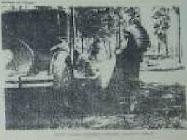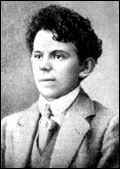Just after noon in Providence, Good Friday. Why "good"? Old medieval usage - like saying "Holy Friday".
Have been reading Eric Santner's interesting & concise book, On the Psychotheology of Everyday Life. An exploration of shared territory of Freud and Franz Rosenzweig (Star of Redemption) : offers a defense of Judeo-Christianity in terms of very contemporary, postmodern psychology (by way of Emmanuel Levinas, trendy thinker Slavoj Žižek, scholar Robert A. Paul, & others). The basic idea (greatly oversimplified here) is that this ancient monotheistic religious culture(s) is not, as some have argued, an ideological engine of exclusion and inter-cultural conflict - but rather represents a pathway to psychic liberation, working through the psycho-ideological complexes and learned/subconscious behaviors that trap us in patterns of alienation, dehumanization, objectification, etc.
(I come to this kind of study with some skepticism... often the refined and technical psychologizing seems to over-complicate matters which should resolve themselves in simplicity (how to love God, how to have faith, how to love others). Yet again, though... Santner's arguments are cogent, and these matters are inherently complex, as well.)
The center of Santner's thinking (as it seems to be of Rosenzweig's) is this tradition's welding together of the love of God with the love of neighbor. You can't have one without the other. But Santner, with Freud & Rosenzweig, looks beneath the obligatory, learned patterns of social ethics (the realm of the "superego"), toward a concept of the irreducible individuality, the singularity, of the person : rooted, not in some idealization of "personality", but in the self as a solitary embodiment - singled out, specifically, by death. Countering this condition, and its angst (the knowledge of death), Rosenzweig sketches a concept of God as intervening in the midst of present life : as bringing about a transvaluation of the terms of existence, through the force of love. Santner's/Rosenzweig's "love" is not some vague cosmic charity, but rather a passionate demand that we love God - personally - in the same way that God calls us by name : calls us in our singularity, by our proper name. In the same way, we encounter God personally - insofar as we encounter our neighbor in a condition of complete "soul liberty" (Roger Williams' term). That is, the encounter involves an acceptance of the other as completely other - as free, as strange, as idiosyncratic, as driven, as eccentric, as outcast as this neighbor may be. Santner replays Rosenzweig's sense that our relation with God and neighbor has to move beyond the "third person" formulae - the abstract systems - of traditional philosophy and theology.
The "folk tale" quality of much of the Bible lends itself, it seems to me, to a sense of God's "impersonations". This has often been interpreted as primitivism, as childish anthropomorphizing. We are supposed to look beneath the husk of the fairy-tale allegory of God's personal acts, for the hidden spiritual/philosophical fruit. This is one way to read the Bible, and it has its own venerable legitimacy and interest. But another way to read is for the inherent narrative/dramatic thrill itself - as a verbal approximation of an actuality which in itself is inexpressibly real, dramatically intense. (This, by the way, is also how I understand poetry in relation to other modes of discourse. It is our most vivid verbal approximation of living actuality.)
Santner, clearly, is re-interpreting issues that have been debated for thousands of years, both early and late. They are not new. And my rehash, here, does not do him justice (I make it sound too familiar). But as I read his summary of Rosenzweig's theology - the idea of divine "revelation" as something that breaks through (in a traumatic way) the patterns of the world and calls us personally, by name - I'm stirred by echoes of my own (traumatic) experience. It rings true for me.
I've written many times on this blog about my "Shakespeare event" of forty years ago. In Santner's psychoanalytic terms, it was a kind of breakdown, a surging up of unconscious forces. It was also a pivotal experience for me, a complete and lasting change of direction and consciousness. And it was an uncanny crisis of being called by name. (This earlier post touches on it... if you search the blog with "Shakespeare" & "sonnets" you may find more.)
Happy Easter, everyone...
4.18.2014
Subscribe to:
Post Comments (Atom)



No comments:
Post a Comment